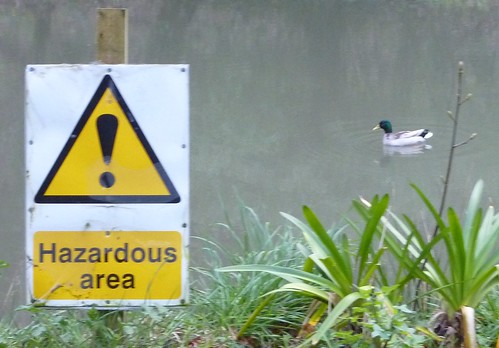Hazardous environments: I like to think of this as being a metaphor for any situation in which one is challenged.
Read MoreHazardous Environments
I was working in Jersey last week, and came across this sign.
 OK if you're a duck...I like to think of this as being a metaphor for any situation in which one is challenged. It may be a conference, or it may be a small gathering of friends or colleagues (I use the word 'or' in the Boolean sense). It may be a new assignment, or a new team to manage, or a new boss. It may be a new syllabus, or a new piece of software. It may be a new government initiative. Or it may be a failure to launch a new government initiative.
OK if you're a duck...I like to think of this as being a metaphor for any situation in which one is challenged. It may be a conference, or it may be a small gathering of friends or colleagues (I use the word 'or' in the Boolean sense). It may be a new assignment, or a new team to manage, or a new boss. It may be a new syllabus, or a new piece of software. It may be a new government initiative. Or it may be a failure to launch a new government initiative.
It seems to me that what keeps good educationalists interested, and therefore interesting, is continually venturing into 'hazardous areas'. Where old assumptions and current paradigms no longer work, and long-honed skills lack relevance.
Involvement in educational ICT has its own challenges. There is the obvious one, that of constantly having to learn about, and learn how to use, new applications. But there is a curricular and assessment challenge too, which is more subtle. As new developments make certain things easier to achieve, it becomes untenable to give credit for achieving them, from a skills point of view.
A good example of this is desktop publishing. My first desktop published page took me about an hour and a half to achieve, as I figured out what I had to do. Once 'wizards' and templates had been introduced, by Microsoft Publisher, the same task took little longer than it took to enter the text. What was once a highly-skilled operation suddenly became almost unskilled.
This is reflected in several national ICT curricula I have looked at: as the grade level rises, the skills required rise less quickly. In fact, I would argue that in the English National Curriculum for ICT, there are hardly any more skills to learn beyond Level 4. You can achieve Level 8 with not much more than a Level 4 skill set, in my opinion. Why? Because the further up the ladder you go, the more important become factors like feedback (and therefore iteration) and systematic (strategic) thinking.
In this context, talk of digital natives or cool tools is not especially helpful. The real issue is that one must be continually finding new challenges for youngsters. Challenges which:
- Make use of their current technical skills but nudge them towards the next level;
- Are relevant to them personally in some way;
- Are problems to be solved;
- Excite both them and their teachers;
- Are not easy; ...
- ... Yet are not so difficult as to make one want to give up;
- Have many facets;
- Encourage collaboration; ...
- ... And friendly rivalry;
- Cannot be assessed by a tick list.
I often hear people bemoan the fact that ICT lessons are boring, and then proceed to blame the National Curriculum. I think the National Curriculum is broad and flexible enough to cope with modern demands -- where people actually make them.
That to me is the real problem: that for all sorts of understandable reasons many teachers do not make real demands of their students. They provide them with intellectually safe, and therefore boring, environments.
They should be providing intellectually hazardous ones.
You Need To Set a Good Example
If you want students to be good learners and users of technology, you have to set a good example. That is basically the message of Shelly Terrell's latest post, Most Teachers Don't Live There. Shelly asks:
 Shelly Terrell
Shelly Terrell
If we are knowledge sharers, shouldn’t we continue to fill ourselves with knowledge?
If we want to inspire students to continue learning throughout their lives, then shouldn’t we continue to learn throughout our lives?
If we want motivated students who see learning as a journey, then shouldn’t we continue our journey?
If we want to motivate students to be the best in their fields, then shouldn’t we be the best in our fields?
If we want other educators to listen to our ideas, then shouldn’t we read about their ideas?
If we want support from our colleges, then shouldn’t we support their workshops and projects?
If we want students to use digital media responsibly, then shouldn’t we give them access and show them how?
If we want student to not let technology overtake their lives, then shouldn’t we teach them how to balance themselves?
How can we teach balance, if we don’t have any social media in our diet?
These are great questions, and they are spot on. Whether you work in a school, a Local Authority or for a company or for yourself, if you do nothing else you must at least be an excellent role model in your appraoch to education in general and to educational technology in particular.
In fact, I would go further than Shelly has, and say it's not only about setting a good example to our students, but to our colleagues as well.
Of course, some of Shelly's challenges are hard to meet, like the ones about balance. Recently we watched a programme called "Email is ruining my life", which looked at someone who sleeps with her Blackberry next her in case an email comes through in the middle of the night, checks emails in the bathroom, checks them whilst having dinner.... I am not that bad, but I must be heading in that direction because at the end of the programme Elaine said to me:
"Recognise anyone you know?"
I tried to plead the 5th, but that doesn't cut much ice in England.
It reminds me of this story:
A woman takes her little boy to see a Holy Man. She says, "Please tell my son to stop eating sugar."
He replies: "Certainly. Bring your son to me in three days' time."
Three days later, she returns with her son, and the Holy Man says to him, "Stop eating sugar."
The woman says, "Why couldn't you have told him that three days ago?"
"Because", he says, "Three days ago I had not stopped eating sugar."
Shelly's post is very challenging, I think, and she finishes it with a great challenge to the reader. Do head on over there to read her post in full.
